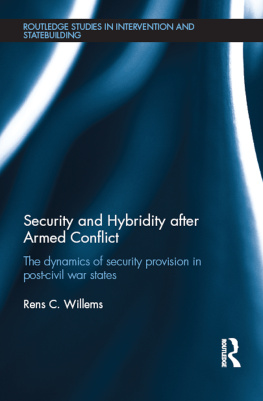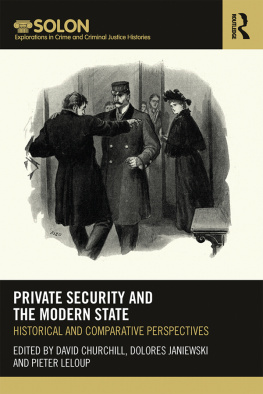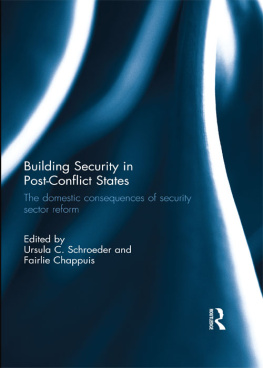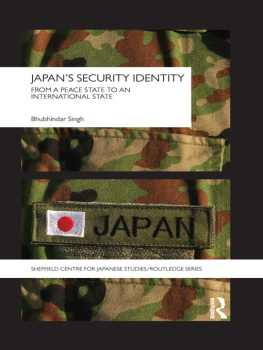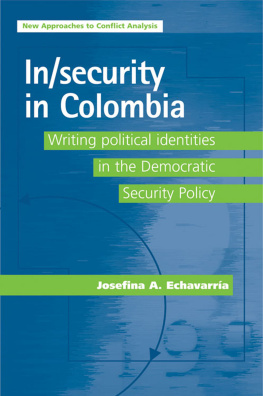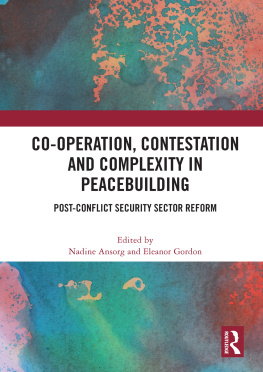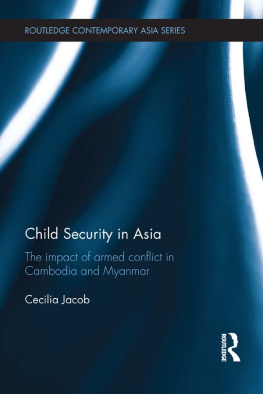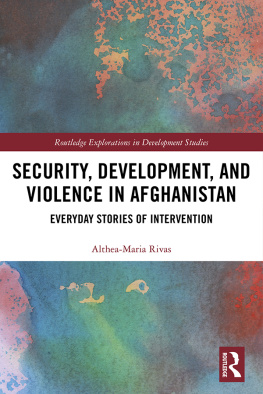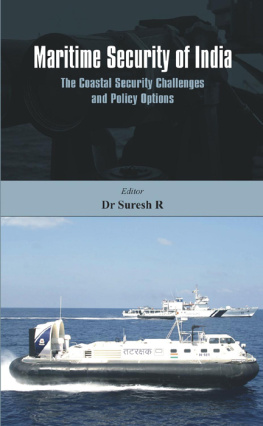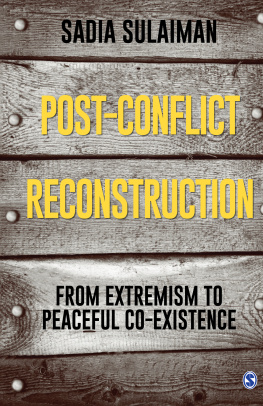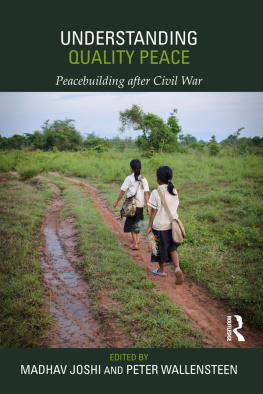Security and Hybridity after Armed Conflict
This book examines the dynamics of security provision in international interventions in post-conflict states.
It focuses on how international security interventions such as Disarmament, Demobilisation and Reintegration (DDR) programmes, Security Sector Reform (SSR) and Armed Violence Reduction (AVR) play out in the post-civil war context in which they are implemented. The underlying assumptions of such interventions are that the state is the best placed to organise violence, that the ideal state has to function as an organisation with the legitimate monopoly on the use of violence, and that the primary task of the state is the provision of security. Post-civil war contexts, however, are characterised by hybridity, in which various authority structures are overlapping, cooperating and competing. The interactions between different security actors (both state and non-state) create struggles in society about whose security interests are promoted, which actions to provide security are considered legitimate, and about who is considered a legitimate security actor. This book investigates the interactions between international actors organising and supporting security interventions and the local security dynamics created by the interactions between both state and non-state actors involved in security. It draws on extensive field research in Eastern Democratic Republic of Congo, Burundi and South Sudan.
This book will be of much interest to students of statebuilding, peacebuilding, peace and conflict studies, security studies and IR.
Rens Willems is a Research Fellow at the University for Peace, The Hague, and has a PhD from Utrecht University.
Routledge Studies in Intervention and Statebuilding
Series Editor: David Chandler
Statebuilding and Intervention
Policies, practices and paradigms
Edited by David Chandler
Reintegration of Armed Groups After Conflict
Politics, violence and transition
Edited by Mats Berdal and David H. Ucko
Security, Development, and the Fragile State
Bridging the gap between theory and policy
David Carment, Stewart Prest, and Yiagadeesen Samy
Kosovo, Intervention and Statebuilding
The international community and the transition to independence
Edited by Aidan Hehir
Critical Perspectives on the Responsibility to Protect
Interrogating theory and practice
Edited by Philip Cunliffe
Statebuilding and Police Reform
The freedom of security
Barry J. Ryan
Violence in Post-Conflict Societies
Remarginalisation, remobilisers and relationships
Anders Themnr
Statebuilding in Afghanistan
Multinational contributions to reconstruction
Edited by Nik Hynek and Pter Marton
The International Community and Statebuilding
Getting its act together?
Edited by Patrice C. McMahon and Jon Western
Statebuilding and State-Formation
The political sociology of intervention
Edited by Berit Bliesemann de Guevara
Political Economy of Statebuilding
Power after peace
Edited by Mats Berdal and Dominik Zaum
New Agendas in Statebuilding
Hybridity, contingency and history
Edited by Robert Egnell and Peter Haldn
Mediation and Liberal Peacebuilding
Peace from the ashes of war?
Edited by Mikael Eriksson and Roland Kostic
Semantics of Statebuilding
Language, meanings and sovereignty
Edited by Nicolas Lemay-Hbert, Nicholas Onuf, Vojin Rakic and Petar Bojanic
Humanitarian Crises, Intervention and Security
A framework for evidence-based programming
Edited by Liesbet Heyse, Andrej Zwitter, Rafael Wittek and Joost Herman
Internal Security and Statebuilding
Aligning agencies and functions
B.K. Greener and W.J. Fish
The EU and Member State Building
European foreign policy in the Western Balkans
Edited by Soeren Keil and Zeynep Arkan
Security and Hybridity after Armed Conflict
The dynamics of security provision in post-civil war states
Rens C. Willems
First published 2015
by Routledge
2 Park Square, Milton Park, Abingdon, Oxon OX14 4RN
and by Routledge
711 Third Avenue, New York, NY 10017
Routledge is an imprint of the Taylor & Francis Group, an informa business
2015 Rens C. Willems
The right of Rens C. Willems to be identified as author of this work has been asserted by him/her in accordance with sections 77 and 78 of the Copyright, Designs and Patents Act 1988.
All rights reserved. No part of this book may be reprinted or reproduced or utilised in any form or by any electronic, mechanical, or other means, now known or hereafter invented, including photocopying and recording, or in any information storage or retrieval system, without permission in writing from the publishers.
Trademark notice: Product or corporate names may be trademarks or registered trademarks, and are used only for identification and explanation without intent to infringe.
British Library Cataloguing-in-Publication Data
A catalogue record for this book is available from the British Library
Library of Congress Cataloging-in-Publication Data
A catalog record for this book has been requested
ISBN: 978-1-138-01616-3 (hbk)
ISBN: 978-1-315-78118-1 (ebk)
Typeset in Times New Roman
by Wearset Ltd, Boldon, Tyne and Wear
It would not have been possible to write this book without the help and support of the people around me, to only some of whom it is possible to give particular mention here.
First of all, I would like to extend first and foremost warm gratefulness to everybody who was willing to sit down with me and share her or his insights during the field research. Without their patience and willingness this book could not have been written. I hope to do justice to the words of all those I've interviewed. For any errors or inadequacies in fact or interpretation, of course, the responsibility is entirely my own.
For a large part, revising and editing this book was done as part of my work at the University for Peace (UPEACE) Centre The Hague, and I am very grateful that the Board of the Alliance for UPEACE provided this opportunity.
This book is an edited version of my PhD research, which was undertaken at the Centre for Conflict Studies at Utrecht University. I want to thank my former colleagues there, and in particular Professor Georg Frerks and Chris van der Borgh for their guidance during my PhD research. My PhD and this book draw on the work undertaken within the context of the Peace, Security and Development Network's working group Community Security and Community-based DDR in Fragile States. I cannot go without acknowledging the financial support of the Ministry of Foreign Affairs and the valuable inputs and insights provided by the other working group's members from the Centre for International Conflict Analysis and Management (CICAM) of the Radboud University Nijmegen, the Conflict Research Unit of the Clingendael Netherlands Institute of International Relations, the Dutch Ministry of Defence, the Global Partnership for the Prevention of Armed Conflict (GPPAC), PAX, PSO and the Dutch Council for Refugees. It was a pleasure to work with Hans Rouw from PAX in the DRC and South Sudan, and Mathijs van Leeuwen and Jasper Kleingeld in Burundi.

